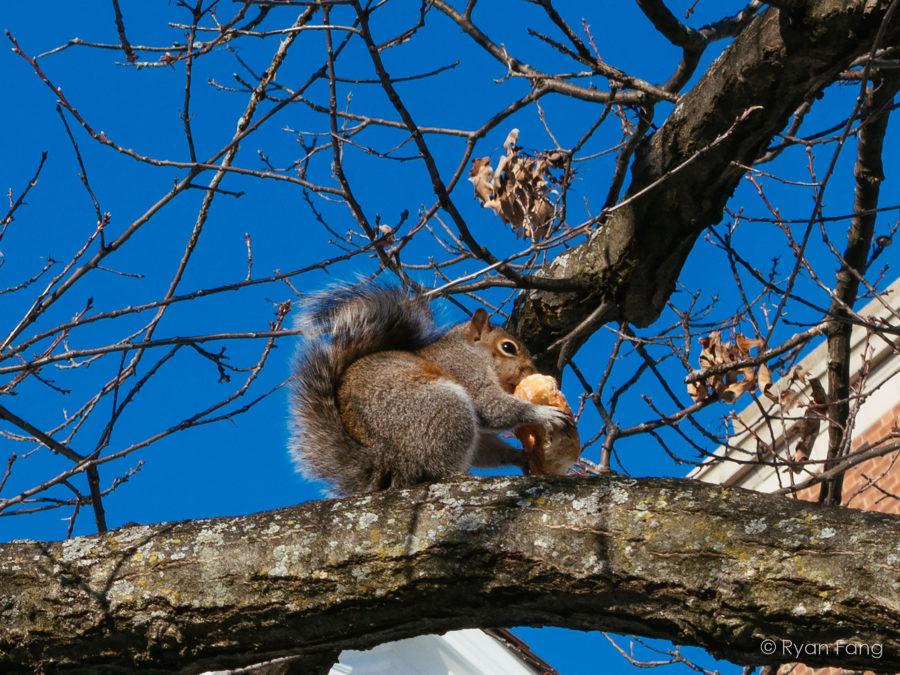University students go nuts on Squirrel Appreciation Day
A squirrel eats donut near the Anniversary Plaza on Friday, Mar 6 2015.
January 19, 2016
Granola Bar Day, National Hugging Day and Rid the World of Fad Diets Day are just a few of the unusual holidays celebrated on Jan. 21. However, one quirky holiday in particular hits pretty close to home with many University students: Squirrel Appreciation Day.
Squirrels are a large part of Illinois culture because of their abundance on campus. In 2013, Huffington Post listed the University as one of the most squirrel-obsessed campuses in the nation.
Many students on the quad who attempt to get close to the animals sometimes feed or pet them.
“I like that they’re all over campus. In my hometown, there’s really not that many squirrels. It’s really crazy when you come to campus, and they’re everywhere. It’s kind of a part of our campus,” said Dana Johnson, junior in ACES.
Johnson favors a particular squirrel on campus, whom she has affectionately named Mr. Jackson after former President Andrew Jackson.
Get The Daily Illini in your inbox!
She described her first encounter with Mr. Jackson.
“I really wanted to feed a squirrel, (so) everyday I tried. I stopped for them all the time, and they would just run away from me. One day, one ran up to me and took (the food) out of my hand,” Johnson said.
Though all squirrels look similar, Johnson said she can always recognize Mr. Jackson. She tries to feed him every day and can usually find him outside of the Henry Administration Building.
“I know (that) it’s him everyday because he’s the fattest one out there, and he’s the only one who will sprint right towards you. He finds us (when) I’m walking by. I usually have peanuts because I see him so often,” Johnson said.
Though squirrels like Mr. Jackson may seem out of the ordinary, Edward Heske, mammal ecologist at the Illinois Natural Resources Survey and University professor, said it’s common.
“Squirrels are really intelligent and they tame really easy. When they learn to see you as a food resource, they’ll approach you,” Heske said. “When they do, they sit on their haunches and sit up with their paws in a begging or praying posture and interact with you by looking at you.”
Some students use their interaction time with the squirrels as a stress reliever from their hectic class load.
“I just find observing them and sometimes being able to interact with them kind of cathartic especially when you’re overwhelmed with schoolwork. It’s a nice, convenient distraction,” said Nick Brown, junior in LAS.
Brown said that while squirrels are not essential to the reputation of the University, he does view them as an interesting benefit to campus life.
“Anytime that you can have a little niche above any other college campus, I think that’s pretty cool, especially when it’s something benign like squirrels,” Brown said.
While squirrels are a significant part of the University, it was not always this way. In fact, in the early 1900s, squirrel populations were low in the community. Former University President Andrew S. Draper tried to change that with the help of University Geologist, Charles Rolfe.
University records show that Draper put together a plan to breed more squirrels specifically for the enjoyment of the University and asked for up to $250 to do so. Today, that sum is equivalent to a little over $7,000.
It was adopted by the Board of Trustees on July 6, 1901.
Heske explained that because of significant deforestation across the northeastern United States in the mid 1800s and early 1900s, the squirrel population saw a dramatic decline. Because of this, many communities started to reintroduce squirrels back into their environments.
“Charles Rolfe got the idea to introduce squirrels to the U of I campus because it would teach the students who are going to classes and have their noses in their books to learn compassion and interaction with wildlife in a positive way, and it would enrich the campus experience for them as well,” Heske said.
After receiving financial approval from the Board of Trustees, the University brought squirrels onto campus and contained them in cages on the Quad until a sufficient amount of squirrels were bred to be set free. Since then, squirrels have thrived around campus and have become a large part of the campus tradition.
“We have very wooded towns, and there (are) plenty of shrubs and hedges for them to hide in. We have lot of acorn producing trees on campus, which are good for them, and they need that over winter,” Heske said. “They can cause us all kinds of trouble. They can get into our attics; they can raid our bird feeders when we don’t want them too. But on the other hand, watching them in the middle of January having their mating chases through the trees is a really fun way of interacting with something else that’s not human.”
Recently, the University has adopted a new symbol for the admissions office.
Since January 2015, a costumed squirrel named Sassy, short for Sassafras, has been roaming the sidewalks of campus and greeting prospective students while on campus tours.
For Brown, squirrels add something to the University experience.
“They certainly interact with the student body more, and you can see that, especially with the way that a lot of students feed them. You can get relatively close to them compared to the other animals physically on campus,” Brown said.
For Heske, having such a strong squirrel presence on campus allows students to build connections with wildlife.
“We all have this connection with nature, no matter how much we live in an urban environment. Interacting with wildlife and nature is something that makes most people happy as long as it’s friendly,” Heske said.







